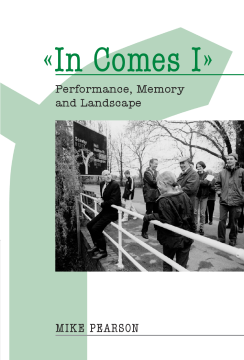
Additional Information
Book Details
Abstract
‘In Comes I’ explores performance and land, biography and locality, memory and place. The book reflects on performances past and present, taking the form of a series of excursions into the agricultural landscape of eastern England, and drawing from archaeology, geomorphology, folklore, and local and family history.
Mike Pearson, a leading theatre artist and solo-performer, returns to the landscape of his childhood – off the beaten track in Lincolnshire – and uses it as a mnemonic to reflect widely upon performance theory and practice. Rather than focusing on author, period and genre as is conventional in the study of drama, the book takes region as its optic, acknowledging the affective ties between people and place.
Offering new approaches to the study of performance, he integrates intensely personal narrative with analytical reflection, juxtaposing anecdote with theoretical insight, dramatic text with interdisciplinary perception. The performances, ranging from folk drama to contemporary site-specific work, are seen in the light of their relationship to their cultural and physical environment.
Mike Pearson is Professor of Performance Studies at University of Wales, Aberystwyth. He is a leading theatre artist, having worked both as director and performer in various theatre companies in Wales; he continues to create performances as a solo artist with German saxophonist Peter Brõtzmann, and with artist/designer Mike Brookes. He is co-author of Theatre/Archaeology (Routledge 2001).
‘In Comes I is a brilliant and timely book, and one that will expand the field of Theatre and Performance Studies by introducing new concepts, functions, forms, and vocabularies.’ ‘…In Comes I is beautifully designed: the images, layout, and font transform the book into a kind of page-bound installation, a landscape to hold and move through. It feels good to look at and to touch.’
New Theatre Quarterly, Vol. 23, Issue 3 August 2007
‘All credit to the author for a book that could have been tedious…but is by contrast heart-warming and inspirational, as Pearson explores history and identity with the help of local historians, museum curators and archaeologists.’
British Archaeology, July/August 2007
‘Pearson handles an impressive range of scholarly knowledge with clarity and elegance, and his book is easy to read. The apparent simplicity is, however, deceptive – for what he is proposing has radical implications for performance-makers and analysts and, indeed, for theatre studies more generally.’
Theatre Research International, 32.3, 2007
‘…essential reading for anyone seriously interested in everything good that performance study can do at its best.’ (Contemporary Theatre Review, 18:1, 114-125, 01 February 2008) ‘However, what may distinguish his book is his unique approach, for by drawing on theory and literature of a range of academic disciplines he challenges academic boundaries and conventions. But he also challenges each of us to reflect in our own ways: to remember, to perform, to recreate, and most importantly, to be free again. Performance artists and theorists will find this book particularly exciting but so too should archaeologists, historians, and folklorists. Even materially driven Baby Boomer bankers might find it rewarding in that it may reawaken something long forgotten of benefit to others, such as the value of creative arts to memory, landscape, and personal experience.’
Time and Mind: The Journal of Archaeology Consciousness and Culture, Volume I, Issue I, March 2008
‘A compellingly attractive, beautifully produced volume, full of maps, photographs, cartographical coordinates, anecdotes, recollections, analyses and speculations.’
Online: http://www.performanceparadigm.net/journal/issue-4/bookreviews/
‘In Comes I is not a book about performance so much as a performance in its own right.’
‘The scholar of English folklore will find much to value here.’
Phil Stafford, Journal of Folklore Research, March 9 2009, www.indiana.edu/%7Ejofr/review
‘You make this work essential reading for anyone seriously interested in everything good that performance study can do at its best.
‘A collector’s piece and that rare work, truly world class, that is always cognisant of class and the world’
Alan Read, Contemporary Theatre Review, Vol. 18 (1), 2008
